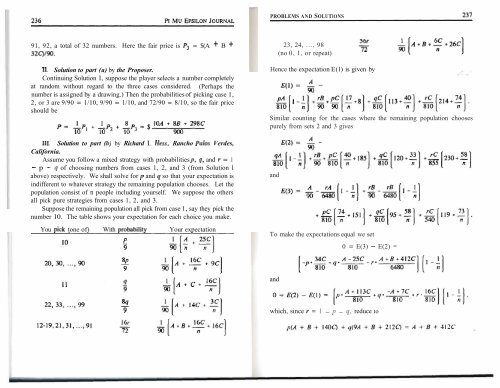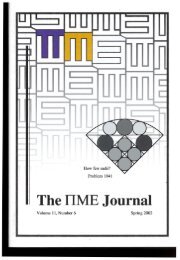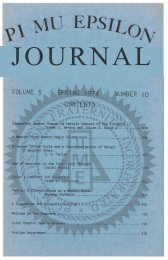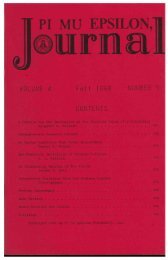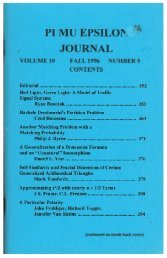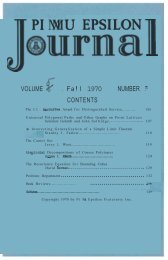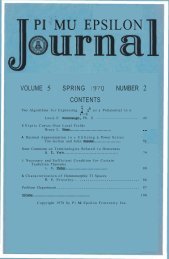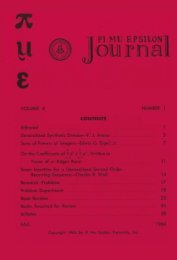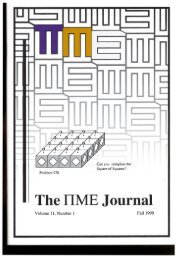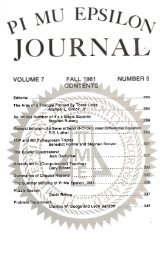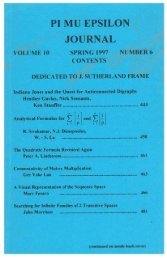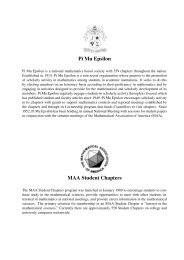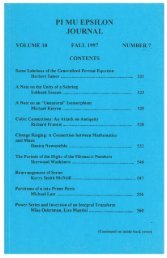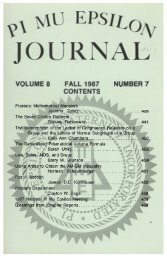PROBLEMS AND SOLUTIONS 235and finallyAlso solved by Paul S. Bruckman.838. . [Fall 19941 Proposed by Florentin Smarandache, Phoenix,Arizona.Let dn = pn+, - pn, n = 1, 2, 3, ..., where pn is the nth primenumber. Find the nature of the seriesn=l dnI. Solution by Richard I. Hess, Rancho Palos Verdes, California.For large x the probability of x being a prime is approximately 11111 x.Thus there is on average one prime between x and x + In x. HenceSince2 x lnx-1- In (In A') - In (In 2),the integral diverges when N becomes infinite, so the sum of the reciprocalsof the primes diverges. <strong>No</strong>w-I= 1 1> -,dn pn+~-Pn Pn+lso E lldn diverges by the comparison test.11. Comment by Paul S. Bruckman, Edmonds, Washington.The same problem by the same author appeared as Problem B-726 inThe Fibonacci Quarterly, <strong>Vol</strong>. 30, <strong>No</strong>. 4 (<strong>No</strong>v. 1992). The publishedsolution, ibid, <strong>Vol</strong>. 32, <strong>No</strong>. 1 (<strong>No</strong>v. 1994) showed that the indicated seriesis divergent.Also solved by Joe Howard, David E. Manes, Rex H. Wu, and theProposer.839. [Fall 19941 Proposed by James Chew, <strong>No</strong>rth Carolina Agricultural .. .-and Technical Stare Uni~r(~r.s~ity, Greensboro, <strong>No</strong>rth Carolina.a) A ticket buyer chooses a number from <strong>10</strong> through 99 inclusive. Anumber is randomly picked as winner. If, for example, 63 is the winner,then each ticket number 63 that has been sold is awarded $A. The reversalticket number 36 is awarded $5. That is, the second prize goes to anyticket with both digits correct, but in the wrong order. The third prize of$C is paid to any ticket that contains at least one of the correct digits, e.g.33, 43, 34, 65, 76, etc. A ticket can win only one prize and prizes are notshared. If you have bought 5 tickets numbered 63, you win $5A. Find thefair price for a ticket.*h) Find the fair price for the game of part (a) if prizes are shared.That is, the ticket seller pays out a total of at most $(A + B + C) inwinnings for any one game, $A is shared among all winning tickets (number63), if any. Then $B is shared among all holders of second prize tickets(number 36). Finally, all third prize winners share the one amount $C.I. Solution to part (a) hy Mark Evans, Louisville, Kentucky.The ticket price should actually he a function of the number the playerchooses. There are three cases.Case 1. To illustrate the nine numhers that end in zero, suppose youpick the number <strong>10</strong>. You win $A with probability 1/90, you cannot win $B,and you win $C if any of 11, 12, ..., 19, 20, 21, 30, 31, .... 90, 91 ischosen, with probability 25/90. The fair price is <strong>Pi</strong> = $(A + 25Ql90.Case 2. Suppose the buyer picks one of the nine numbers with two likedigits. For example, suppose you pick 11. You win $A if 11 is chosen,with probability 1/90, you cannot win $B, and you win $C if any of <strong>10</strong>, 12.13, ..., 19, 21 , 31 , ..., 91 is chosen, with probability 17/90. Hence the fairprice for your ticket is P, - = $(A + 17Qf90.Case 3. There are 72 remaining numhers, such as 12, having twibdistinct digits, neither of which is 0. Then you win $A with prob;tbility1/90, now $B (for the number 21) with probability 1/00, and $C't"or :iny of"the numbers <strong>10</strong>, 11, 13, 14, .... <strong>10</strong>, 20, 22. 23. .... 29, 31, 32. 41. 42. .... -
PROBLEMS AND SOLUTIONS91, 92, a total of 32 numbers. Here the fair price is P3 = $(A + B +320190.11. Solution to part (a) by the Proposer.Continuing Solution I, suppose the player selects a number completelyat random without regard to the three cases considered. (Perhaps thenumber is assigned by a drawing.) Then the probabilities of picking case 1,2, or 3 are 9/90 = 1/<strong>10</strong>, 9/90 = 1/<strong>10</strong>, and 72/90 = 8/<strong>10</strong>, so the fair priceshould be111. Solution to part (b) by Richard I. Hess, Rancho Palos Verdes,California.Assume you follow a mixed strategy with probabilities p, q, and r = 1- p - q of choosing numbers from cases 1, 2, and 3 (from Solution 1above) respectively. We shall solve for p and q so that your expectation isindifferent to whatever strategy the remaining population chooses. Let thepopulation consist of n people including yourself. We suppose the othersall pick pure strategies from cases 1, 2, and 3.Suppose the remaining population all pick from case 1, say they pick thenumber <strong>10</strong>. The table shows your expectation for each choice you make.You pick tone of) With probability Your expectation23, 24, ..., 98(no 0, 1, or repeat)Hence the expectation E(l) is given bySimilar counting for the cases where the remaining population choosespurely from sets 2 and 3 givesandTo make the expectations equal we set0 = E(3) - E(2) =andwhich, since r = 1 - p - q, reduce to


